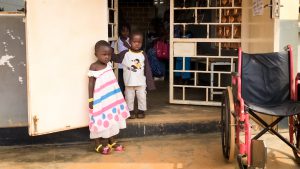How OpenMRS is Used to Fight Malaria in Endemic Areas
 Jeff NeimanChildren receiving care at a health clinic using OpenMRS in rural Uganda. Statistics from the Ministry of Health show that malaria is still the leading cause of death in Uganda, accounting for over 27% of deaths.
Jeff NeimanChildren receiving care at a health clinic using OpenMRS in rural Uganda. Statistics from the Ministry of Health show that malaria is still the leading cause of death in Uganda, accounting for over 27% of deaths.
OpenMRS is an electronic medical record platform designed to be used in low-resource environments where malaria and many other deadly diseases are endemic such as Uganda, where malaria is the primary cause of death in children. OpenMRS is currently used in over 1,800 medical clinics in 64 countries, providing the health information technology infrastructure that is foundational to over 6.3 million patients.
Malaria causes an estimated 214 million cases and 438,000 deaths worldwide in 2015, mostly affecting young children in sub-Saharan Africa. It contributes to poverty; in Africa alone, costs of illness, treatment, and premature death from malaria are at least $12 billion per year. Malaria’s toll would be much higher without the efforts of CDC and other global partners who consistently develop policies and procedures based on actionable data . From 2000 through 2015, the massive scale-up of malaria prevention and treatment interventions saved approximately 6.2 million lives globally; malaria death rates in Africa were cut by more than half. However, malaria remains a major public health problem, despite it being both preventable and treatable.
Children are particularly susceptible to cerebral malaria– the most severe neurological complication of infection from malaria. Some survivors of cerebral malaria have an increased risk of neurological and cognitive deficits, behavioural disorders, and epilepsy. Malaria medication has been shown to improve cognitive function and school performance in clinical trials when compared to placebo groups. The identification of this disease and the administration of appropriate treatments and drugs requires accurate medical record keeping which is extremely difficult while using paper-based systems.
The Technology Behind OpenMRS
OpenMRS includes features for effective medical record keeping such as location based login; patient registration, search, and summary, including diagnosis, vitals, visits, allergies, actions, admissions, discharges and transfers; configure metadata; manage forms; data management (merge patient electronic records); system administration; and registration to the OpenMRS Atlas, which allows for the reporting of implementing clinics worldwide.
The OpenMRS open-source software uses technologies such as Java 8, Hibernate 4.x, Spring 4.x; Open Web Apps (OWA) and Fast Healthcare Interoperability Resources (FHIR) support; Allergy API in core; support for all core services via REST-WS module; multiple identifiers per patient (i.e., patient can have multiple medical record numbers); data entry for electronic forms; data export; patient workflows (so patients can be put into programs and tracked through various states); relationships (to track relationships between two people; such as relatives and caretakers); and reporting tools. Add-on modules are also available or can be developed.
OpenMRS’ Role in Combating Malaria
The use of OpenMRS during the Ebola epidemic allowed for actionable data, rapid response, and provided the foundation for readiness in the future. Having a free, open-source electronic medical record platform (EMR) gave these impacted health clinics the tools necessary to support patient care in an easy-to-understand electronic format. Data helped empower the respective Ministries of Health to develop healthcare policies to prevent the rapid spread of epidemics in the future and improve the availability and delivery of publicly provided health services. The OpenMRS community has strived to achieve similar results from providing actionable data in areas where malaria is still a threat.
 Children receiving care at a health clinic using OpenMRS in rural Uganda. Statistics from the Ministry of Health show that malaria is still the leading cause of death in Uganda - accounting for over 27% of deaths. (OpenMRS)The public health armamentarium to fight this disease includes access to data and accurate medical record keeping. Without an EMR, paper based records become lost, lab tests and treatments are either not completed or duplicated, and it’s nearly impossible to establish an accurate medical history. EMRs like OpenMRS support the acquisition, utilization, aggregation, and analysis of health information. This data empowers local healthcare teams, as well as NGO and the Ministries of Health, to better identify patients who are at risk or infected, and provides an ability to track their longitudinal health status to target afflicted areas. Healthcare data and information supports the healthcare team to identify and implement changes that help combat the spread and infectivity of malaria. Data matters and OpenMRS is one technological tool to help ensure that data is available and accessible to those who need it, including the patients and their families.
Children receiving care at a health clinic using OpenMRS in rural Uganda. Statistics from the Ministry of Health show that malaria is still the leading cause of death in Uganda - accounting for over 27% of deaths. (OpenMRS)The public health armamentarium to fight this disease includes access to data and accurate medical record keeping. Without an EMR, paper based records become lost, lab tests and treatments are either not completed or duplicated, and it’s nearly impossible to establish an accurate medical history. EMRs like OpenMRS support the acquisition, utilization, aggregation, and analysis of health information. This data empowers local healthcare teams, as well as NGO and the Ministries of Health, to better identify patients who are at risk or infected, and provides an ability to track their longitudinal health status to target afflicted areas. Healthcare data and information supports the healthcare team to identify and implement changes that help combat the spread and infectivity of malaria. Data matters and OpenMRS is one technological tool to help ensure that data is available and accessible to those who need it, including the patients and their families.
Founded in 2004, OpenMRS is a free, modular open-source electronic medical record platform used in more than 60 low and middle-income countries positively impacting the lives of over 6.3 million patients. As the OpenMRS site explains, OpenMRS is a multi-institution, non-profit collaborative supported by and created by a large open source community. OpenMRS hosts a dedicated Wiki site, email server, and hosts annual meetings to support the global community.
Historically, OpenMRS was designed to be used to combat HIV, and was the most commonly used open source health software in 2012, used in 60% (6/10) of centers involved in HIV care and 27% (3/11) of non-HIV related programs based on publications on the use of electronic medical records in sub-Saharan Africa. Open source databases, such as OpenMRS, can easily be adapted to local requirements and are increasingly used in the context of the scale-up of antiretroviral therapy (ART). Because of OpenMRS’ adaptability, tools for passive disease surveillance and program surveillance were created such as Open Essence (OE). OE was developed using OpenMRS and the Suite for Automated Global Electronic bioSurveillance (SAGES) disease surveillance tool.
The Millennium Villages Project (MVP) introduced OpenMRS and mobile phone technology to ten sub-Saharan African countries working to achieve the Millennium Development Goals. In 2009, in Uganda, the MVP team detected an important issue with malaria diagnosis and treatment in the area. Using OpenMRS data, which links together a particular patient’s complaint, testing, diagnosis and treatment, it was determined that more than half of patients who came in with fever and tested negative for malaria (using smear and/or rapid diagnostic test) were still treated with antimalarials. This detection was only possible by longitudinally identifying the patients who tested negative for malaria but were still treated. It could only be done using an electronic medical record system like OpenMRS.
In response to these findings, an immediate WHO guideline training was performed throughout the clinics, and over the following month OpenMRS detected a 50% reduction in unnecessary treatments. These results saved a substantial amount of resources that would have been misspent on expensive antimalarials (which were now available for actual malaria patients), and contributed to the patients with fever and negative malaria tests being properly treated for their non-malarial illnesses. OpenMRS was used not only to detect the problem, but was also used to monitor the solution and the impact on patient care, even in public clinics in remote areas of Uganda.
The Need for Support
OpenMRS supports an open source and global community dedicated to the platform which is used to improve healthcare delivery and the treatment of diseases such as malaria. Monetary contributions helps to accelerate their ability to provide needed development and functionality to the frontline healthcare teams across the world. Financial support to OpenMRS is used for six major areas: developing the infrastructure needed to enhance and run a sustainable electronic record keeping system; helping the OpenMRS community empower developers to actively support implementing facility around the world; foundational fees required to support our community; training and education for members of the OpenMRS community; meetings relating to OpenMRS development; and scholarships and travel grants to participate in OpenMRS opportunities.
Go to OpenMRS’ website to support them financially, get involved as a volunteer, or to find out how you can implement OpenMRS at your healthcare facility!
| How OpenMRS is Used to Fight Malaria in Endemic Areas was written by Jeff Neiman. It was originally published in OpenMRS.org and reprinted in Open Health News under the Creative Commons Attribution 4.0 International license (CC BY 4.0). The original copy of the article can be found here. |
- Tags:
- adaptability
- Allergy API
- antiretroviral therapy (ART)
- cerebral malaria
- data management
- Ebola epidemic
- electronic medical records (EMRs)
- Fast Healthcare Interoperability Resources (FHIR)
- free and open-source electronic medical record platform (EMR)
- health information technology (HIT)
- Hibernate 4.x
- human immunodeficiency virus (HIV)
- Java 8
- Jeff Neiman
- malaria
- Millennium Development Goals
- Millennium Villages Project (MVP)
- Open Essence (OE)
- open source
- open source databases
- open source software (OSS)
- Open Web Apps (OWA)
- OpenMRS
- OpenMRS Atlas
- passive disease surveillance and program surveillance
- patient workflows
- pediatric health
- public health problem
- REST-WS module
- rural Uganda
- Spring 4.x; sub-Saharan Africa
- Suite for Automated Global Electronic bioSurveillance (SAGES)
- Ugandan Ministry of Health
- World Health Organization (WHO)
- Login to post comments